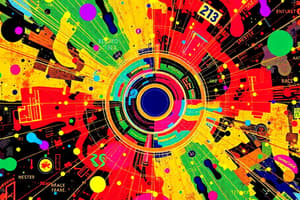Podcast
Questions and Answers
Match the following quantum computing term with its description:
Match the following quantum computing term with its description:
Superposition = Property used in quantum processors to perform calculations in parallel Entanglement = Unique property of quantum systems used to process information Qubits = Units controlled by quantum gates through logical operations Transistors = Components used by classical computers to represent 0s and 1s
Match the quantum computing application with its description:
Match the quantum computing application with its description:
Cryptography = Field where quantum computers could break encryption methods, requiring new cryptography methods Scientific simulations = Capability of quantum computers to simulate molecules, particles, and complex systems beyond classical computers Optimization problems = Area where quantum computers can solve logistic, scheduling, and resource allocation problems more efficiently Machine learning and artificial intelligence = Usage of quantum computers to accelerate machine learning tasks and enhance AI model performance
Match the following statements with the correct description of the future of quantum computing:
Match the following statements with the correct description of the future of quantum computing:
Advancements in quantum technologies = Expected to lead to significant scaling up of quantum processors in the coming years Commercial application = Anticipated widespread use of quantum computing in various industries and fields Quantum communication and sensing technologies = Expected to generate substantial revenues alongside quantum computing applications Computational power leap = Quantum computing offers the potential to solve problems currently beyond classical computers
Match the following terms with their descriptions:
Match the following terms with their descriptions:
Match the following sectors with their potential transformation by quantum computing:
Match the following sectors with their potential transformation by quantum computing:
Match the following features with their relevance to quantum computing:
Match the following features with their relevance to quantum computing:
Match the following concepts with their definitions:
Match the following concepts with their definitions:
Match the following statements with their accurate descriptions:
Match the following statements with their accurate descriptions:
Flashcards are hidden until you start studying
Study Notes
Quantum Computing: A Revolution in Computational Power
Quantum computing is a revolutionary approach to computation that harnesses the principles of quantum mechanics to solve problems that are too complex for classical computers. This new technology has the potential to transform various sectors, from finance and healthcare to logistics and transportation, by providing solutions to problems that would previously take ages to solve or were even impossible. In this article, we will explore the basics of quantum computing, its key principles, and its potential applications.
Understanding Quantum Computing
Classical computers, the devices we use daily, are based on bits, which can represent either a 0 or a 1. Quantum computers, on the other hand, utilize quantum bits, or qubits, which can exist in a superposition of both 0 and 1 simultaneously. This property, known as superposition, allows quantum computers to perform multiple calculations at once, making them exponentially faster than classical computers for certain types of problems.
Quantum entanglement is another unique feature of quantum computers. It is a phenomenon where two qubits can have connected properties, such that the state of one qubit can be manipulated by actions done to the other. This property is used in quantum processors to ensure that calculations are performed in parallel, further increasing the computational power of quantum computers.
Key Differences Between Quantum and Classical Computers
While both quantum and classical computers use chips, circuits, and logic gates, they differ in the way they process information. Quantum computers use quantum gates to control qubits through logical operations, while classical computers use transistors to represent 0s and 1s. Additionally, quantum computers use superposition and entanglement, which are unique properties of quantum systems, to process information.
Potential Applications of Quantum Computing
Quantum computing has the potential to revolutionize various fields, including:
- Cryptography: Quantum computers could break many of the encryption methods used today, leading to a need for new, quantum-safe cryptography methods.
- Scientific simulations: Quantum computers can simulate the behavior of molecules, particles, and complex systems, which is currently beyond the capabilities of classical computers.
- Optimization problems: Quantum computers can solve optimization problems more efficiently than classical computers, which has potential applications in logistics, scheduling, and resource allocation.
- Machine learning and artificial intelligence: Quantum computers can be used to accelerate machine learning tasks and improve the performance of AI models.
The Future of Quantum Computing
Quantum computing is still in its early stages, with most quantum computers currently having fewer than 100 qubits. However, advancements in quantum technologies are being made rapidly, and quantum processors are expected to scale up significantly in the coming years. The technology is also expected to see widespread commercial application in the future, with other quantum technologies like quantum communication and quantum sensing potentially generating significant revenues.
In conclusion, quantum computing represents a significant leap forward in computational power, offering the potential to solve problems that are currently beyond the capabilities of classical computers. As the technology continues to advance, we can expect it to have a profound impact on various industries and scientific fields.
Studying That Suits You
Use AI to generate personalized quizzes and flashcards to suit your learning preferences.




